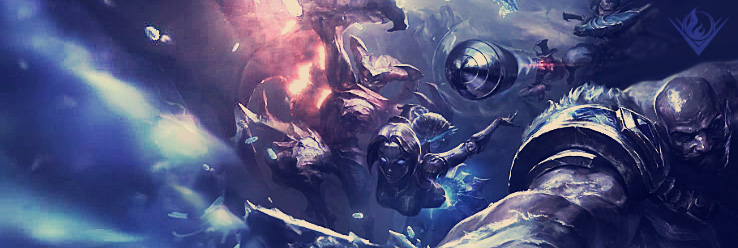Views: 3687 Life Leveling: Teamwork
|
Report
One of the easiest lessons to learn from League of Legends is the importance of teamwork and reliance on your team. This is seen in the professional workplace, especially multi-disciplinary fields, and is a very important concept. Working as a team between people you don’t know is critical to advancing yourself in life and in your career, and those same concepts are seen on the fields of justice.
On my last blog entry, I mentioned how one of my college professors gave a lecture on teamwork and synergy. While he wasn’t explicitly talking about League of Legends, many of the terms, concepts and ideals paralleled the League. He went over how a team needs to synergize, become greater than the sum of the parts and how there should never be someone carrying the team in order to succeed. After further research into the subject, I have come across this:
This is an image from a book by Patrick Lencioni called “The Five Dysfunctions of a Team: A Leadership Fable.” The story follows a fiction CEO’s battle with organizing and managing a team of individuals. While I have not read the book, I can automatically see how these “dysfunctions” apply to League of Legends and teams.
Starting from the top, you have the first segment of inattention to results. This can be people on your team that don’t care about winning, losing or doing well. Many people on your team have their heads somewhere else, or simply don’t mind losing. In a solo queue situation, this happens very often and is construed as “trolling.” While someone who is playing to win is considered a “tryhard,” the concept of tryharding is paying attention to the only result that matters: winning the game. When playing on a serious team and trying to gain results, paying attention and focusing on what you’re trying to achieve, specifically, is key.
The second segment, and most popular in League, is avoidance of accountability. People will berate you endlessly for poor performance; however they never hold themselves responsible for loss. It is never the accuser’s fault that the game has gone sour; they have died because mid lane fed! Any negative outcome in a game devolves into finger pointing until eventually the “team” settles on one person to blame. While your bottom lane feeding will certainly hurt your chances, it takes a blatantly obvious situation and intentional feeding to have no hand in why you lost your game. Nobody queues up with the intent of feeding, so maybe you can do more to help them get out of that rut. No win or loss is perfect and free of accountability from the teammates.
Moving down further, a lack of commitment can be seen in people that don’t play with the team and try as hard as anyone else there. The further you move down this triangle, the less it applies to solo queue. This can be seen in start-up teams with devoted members, not in a solo queue environment. There shouldn’t be a member of the team that does not commit to the team. Maybe it’s your friend from home or college roommate that plays with you because you know them. If they are not committed to the team, practicing and furthering themselves, they will remain a weak link. This can be seen a lot in the pro team Epik Gaming, who does a lot of individual practice and not as much team practice. The fact that they still place is testament to their skills, however if they were more committed to each other and their efforts, they would be untouchable.
The second to last part, a fear of conflict, is always present in teams, especially professional teams. This can be most recently seen with Counter-Logic Gaming’s (CLG) decision to remove Elementz from their roster. While I can’t say that their decision was correct or not, they had felt he was a weak link for a while and did not move him due to fear of conflict. There is always that one person you don’t want to play on a team with because they’re not up to par. If that person is your friend, telling them this information is often very difficult.
Resting at the base of this triangle is the absence of trust. This manifests itself in many ways and is always prevalent in bad teams. When you watch teams like Team SoloMid (TSM), you see that they absolutely trust each other’s abilities. They will build items that work well together, ward for each other and take sacrifices that help the team. TSM is one of the most devoted teams in the scene right now, devoted enough to put their life on pause in order to move into a gaming house together. This shows an absolute trust in each other and their abilities. This trust comes out in their gameplay when they take objectives and risks that require trust in your team. In a public match, you see the opposite. Mejai’s Soulstealer and other stack items are there because you want to win the game by yourself. You don’t trust your team to help you win, whether subconsciously or not. Risks aren’t typically taken and opportunities that trust offers are not taken advantage of. This impacts character selection as well, you can’t trust your AD carry when playing support at lower levels.
Through these levels of team building, we are able to see clearly how teamwork applies to real life as well as League of Legends. This person wasn’t writing a book about Summoner’s Rift, but the lessons applied are the same. Through trusting your team, not being afraid of conflict, being committed and accountable and paying attention to your results, you will not only succeed in a professional environment, but in League of Legends as well. Stay tuned for my next post and until then…
GL HF,
Hahano
On my last blog entry, I mentioned how one of my college professors gave a lecture on teamwork and synergy. While he wasn’t explicitly talking about League of Legends, many of the terms, concepts and ideals paralleled the League. He went over how a team needs to synergize, become greater than the sum of the parts and how there should never be someone carrying the team in order to succeed. After further research into the subject, I have come across this:
This is an image from a book by Patrick Lencioni called “The Five Dysfunctions of a Team: A Leadership Fable.” The story follows a fiction CEO’s battle with organizing and managing a team of individuals. While I have not read the book, I can automatically see how these “dysfunctions” apply to League of Legends and teams.
Starting from the top, you have the first segment of inattention to results. This can be people on your team that don’t care about winning, losing or doing well. Many people on your team have their heads somewhere else, or simply don’t mind losing. In a solo queue situation, this happens very often and is construed as “trolling.” While someone who is playing to win is considered a “tryhard,” the concept of tryharding is paying attention to the only result that matters: winning the game. When playing on a serious team and trying to gain results, paying attention and focusing on what you’re trying to achieve, specifically, is key.
The second segment, and most popular in League, is avoidance of accountability. People will berate you endlessly for poor performance; however they never hold themselves responsible for loss. It is never the accuser’s fault that the game has gone sour; they have died because mid lane fed! Any negative outcome in a game devolves into finger pointing until eventually the “team” settles on one person to blame. While your bottom lane feeding will certainly hurt your chances, it takes a blatantly obvious situation and intentional feeding to have no hand in why you lost your game. Nobody queues up with the intent of feeding, so maybe you can do more to help them get out of that rut. No win or loss is perfect and free of accountability from the teammates.
Moving down further, a lack of commitment can be seen in people that don’t play with the team and try as hard as anyone else there. The further you move down this triangle, the less it applies to solo queue. This can be seen in start-up teams with devoted members, not in a solo queue environment. There shouldn’t be a member of the team that does not commit to the team. Maybe it’s your friend from home or college roommate that plays with you because you know them. If they are not committed to the team, practicing and furthering themselves, they will remain a weak link. This can be seen a lot in the pro team Epik Gaming, who does a lot of individual practice and not as much team practice. The fact that they still place is testament to their skills, however if they were more committed to each other and their efforts, they would be untouchable.
The second to last part, a fear of conflict, is always present in teams, especially professional teams. This can be most recently seen with Counter-Logic Gaming’s (CLG) decision to remove Elementz from their roster. While I can’t say that their decision was correct or not, they had felt he was a weak link for a while and did not move him due to fear of conflict. There is always that one person you don’t want to play on a team with because they’re not up to par. If that person is your friend, telling them this information is often very difficult.
Resting at the base of this triangle is the absence of trust. This manifests itself in many ways and is always prevalent in bad teams. When you watch teams like Team SoloMid (TSM), you see that they absolutely trust each other’s abilities. They will build items that work well together, ward for each other and take sacrifices that help the team. TSM is one of the most devoted teams in the scene right now, devoted enough to put their life on pause in order to move into a gaming house together. This shows an absolute trust in each other and their abilities. This trust comes out in their gameplay when they take objectives and risks that require trust in your team. In a public match, you see the opposite. Mejai’s Soulstealer and other stack items are there because you want to win the game by yourself. You don’t trust your team to help you win, whether subconsciously or not. Risks aren’t typically taken and opportunities that trust offers are not taken advantage of. This impacts character selection as well, you can’t trust your AD carry when playing support at lower levels.
Through these levels of team building, we are able to see clearly how teamwork applies to real life as well as League of Legends. This person wasn’t writing a book about Summoner’s Rift, but the lessons applied are the same. Through trusting your team, not being afraid of conflict, being committed and accountable and paying attention to your results, you will not only succeed in a professional environment, but in League of Legends as well. Stay tuned for my next post and until then…
GL HF,
Hahano










Its so true I'm playing regulary with a set team and we are doing lot of ranked games lately.
Though most of us can't put in as much time as some pros since we have jobs, school and other responsibilitys still(or especially because of it) much of above can be applied to our team.
Gonna show and talk about this with the rest of the guys.
Thanks!
Interesting how the triangle works though :)